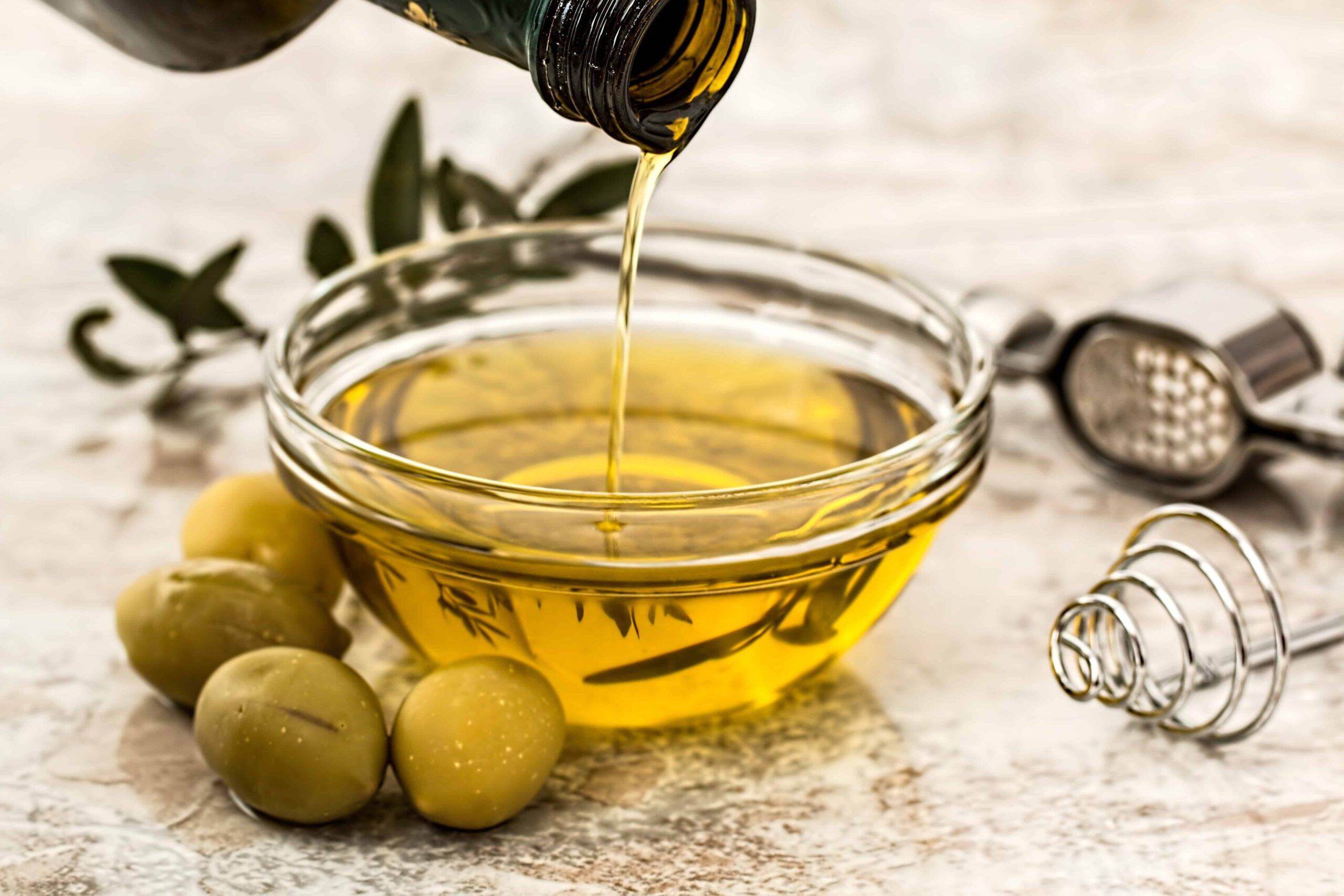Health Benefits of Olive Oil

Health Benefits of olive oil
Olive oil is a type of vegetable oil extracted from olives, the fruit of the olive tree. It is composed of a high percentage of monounsaturated fatty acids, which have been shown to have beneficial health benefits.
These fatty acids can help reduce bad cholesterol levels and improve heart health, among other things.
Olive oil also contains polyphenols, which are antioxidants that can protect cells from damage and may help reduce the risk of some diseases. Below are 15 health benefits of olive oil that should be a part of your life.

Different Types of Olive Oil:
There are many different types of olive oil, each with its unique flavour and properties. The three main types of olive pomace oil are Extra Virgin Olive Oil (EVOO), Virgin or refined Olive Oil, and Extra Light Olive Oil.
Extra Virgin Olive Oil:
EVOO is the highest quality olive oil with a fruity, green flavour. It is also the most expensive. EVOO is classified as a “virgin” because it is made from the first cold pressing of olives and has no chemical or heat treatment added. It is also rich in antioxidants, which help protect the body against disease and ageing.
Virgin Olive Oil:
Virgin olive oil is a good choice if you look for a more mild flavour than EVOO. This type of olive oil is made from olives that have been crushed without the use of chemicals or high heat. It contains antioxidants and vitamins, and minerals that promote heart health and reduce the risk of chronic diseases.
Extra Light Olive Oil:
Extra light olive oil has a milder flavour than EVOO or virgin olive oil, making it a good choice. This oil is also high in monounsaturated fats and antioxidants, which promote heart health and reduce the risk of chronic diseases like cancer.
Health Benefits of Olive Oil:
1. Olive Oil Is Good for Skin:
Olive oil has been used for generations as a natural remedy for various skin conditions. It is rich in antioxidants and vitamins E and A, which are known to protect the skin from damage caused by free radicals.
Olive oil helps maintain the skin’s natural moisture balance, keeping it hydrated and soft. Furthermore, the anti-inflammatory properties of olive oil can help to soothe dry, irritated skin.
When applied topically, olive oil can help to reduce the appearance of wrinkles and fine lines. Some studies have shown that regular use of olive oil can slow down the ageing process.
Thanks to its numerous benefits, it is no wonder that olive oil is often hailed as a miracle ingredient for healthy, youthful-looking skin.
2. Olive Oil May Help Prevent Strokes:
Olive oil is a nutrient-rich food that has been linked to several health benefits, including a reduced risk of stroke.
This is partly due to the high levels of polyphenols found in olive oil, which act as powerful antioxidants that help to protect the body from damaging free radicals.
Research has shown that olive oil may help reduce inflammation and improve blood pressure, key risk factors for stroke.
Including more olive oil in your diet can effectively lower your risk of stroke and maintain overall cardiovascular health.
3. Olive Oil Is Protective Against Heart Disease:
Olive oil is a heart-healthy fat that is protective against heart disease. Research has shown that olive oil can help lower blood pressure and cholesterol levels, both of which are risk factors for heart disease.
Olive oil is rich in antioxidants, which help to prevent the formation of plaques in the arteries. While these benefits are impressive, it is important to remember that olive oil should be used in moderation.
Too much of any type of fat can increase your risk of cardiovascular disease. It is best to use olive oil sparingly and substitute it for other unhealthy fats, such as butter or margarine.
4. Prevents Weight Gain and Obesity:
Although olive oil is high in fat, it is not associated with weight gain or obesity. Studies have shown that olive oil may even help to promote weight loss.
One reason for this is that olive oil helps to improve the digestibility of other nutrients, such as carbohydrates. Additionally, it helps to reduce levels of inflammation in the body, which has been linked to obesity.
Also, olive oil is a source of healthy fats, essential for proper metabolism.
For all these reasons, olive oil is not likely to cause weight gain or obesity.
5. Helps Control Blood Sugar:
Extra virgin olive oil is rich in a type of fatty acid known as oleic acid, which has been shown to help control blood sugar levels.
In one study, rats were given a high-fat diet supplemented with either oleic acid or corn oil. The rats receiving oleic acid had significantly lower blood sugar levels than those receiving corn oil.
Other studies have shown similar results in humans. Increasing insulin sensitivity is one mechanism by which oleic acid may help control blood sugar.
Oleic acid has also been shown to inhibit the activity of an enzyme that is involved in the breakdown of carbohydrates. This means that less glucose is available for absorption into the bloodstream, leading to lower blood sugar levels.
Oleic acid has anti-inflammatory properties, which may also control blood sugar levels. Thus, extra virgin olive oil provides numerous benefits for blood sugar control.
6. Helps Control High Blood Pressure:
Extra virgin olive oil is an excellent source of antioxidants, shown to help control high blood pressure.
The antioxidants in olive oil help prevent the oxidation of LDL cholesterol, which can lead to plaque formation in the arteries.
In addition, olive oil contains compounds such as polyphenols and oleocanthal, which have been shown to have anti-inflammatory properties. These compounds can help to reduce blood pressure by reducing inflammation throughout the body.
Olive oil is a good source of monounsaturated fats, which have been shown to lower LDL cholesterol and improve HDL cholesterol levels. All of these factors combined make olive oil an effective tool in the fight against high blood pressure.

7. Olive Oil May Fight Alzheimer’s Disease:
Olive oil is a nutrient-rich oil with numerous health benefits, including the potential to fight Alzheimer’s disease. This effect is thought to be due to the high antioxidants found in olive oil.
These antioxidants help protect cells from damage and help reduce inflammation in the brain.
Studies have shown that individuals who consume greater olive oil regularly are less likely to develop Alzheimer’s disease or dementia.
While more research is needed to confirm these findings, it seems clear that olive oil may hold valuable promise for those at risk of developing neurodegenerative diseases like Alzheimer’s.
8. Olive Oil May Reduce Type 2 Diabetes Risk:
According to a recent study, olive oil may help reduce the risk of type 2 diabetes.
The study, conducted by a team of researchers from the University of Harvard, found that people who consumed olive oil regularly were less likely to develop the condition than those who did not.
The findings suggest that olive oil could help protect against insulin resistance, which is a key factor in developing type 2 diabetes.
While more research is needed to confirm these findings, the study provides new insights into the potential health benefits of olive oil.
9. The Antioxidants in Olive Oil Have Anti-Cancer Properties:
The antioxidants present in olive oil have been shown to have anti-cancer properties. In laboratory studies, these antioxidants were found to inhibit the growth of cancer cells and promote the death of cancer cells (apoptosis).
The main type of antioxidant in olive oil is polyphenols, which are also found in other plant-based foods such as fruits, vegetables, and whole grains.
Some studies have suggested that the anti-cancer effects of olive oil may be due to its high content of polyphenols. Antioxidants in olive oil can help protect against oxidative damage caused by free radicals, which is considered a major cause of cancer.
However, it is important to note that the research on this topic is still in its early stages, and more studies are needed to confirm these findings.
10. Olive Oil Can Help Treat Rheumatoid Arthritis:

Rheumatoid arthritis is an autoimmune condition that causes the immune system to attack the joints, leading to inflammation, deformed and painful joints, and stiffness.
The anti-inflammatory properties of extra virgin olive oil can help reduce this inflammation, thereby alleviating some of the symptoms of rheumatoid arthritis.
Some studies have shown that regular consumption of olive oil may help prevent the onset of this condition in the first place.
It is a natural way to manage symptoms, and it may be worth incorporating more olive oil into your diet.
11. Fights Harmful Bacteria:
Extra-virgin olive oil is known for its many health benefits, including the ability to fight harmful bacteria in the stomach.
This type of olive oil is rich in oleocanthal compound, which has powerful anti-inflammatory and antibacterial properties.
It also contains high polyphenols, another type of compound with antibacterial activity. These compounds help fight off harmful bacteria in the stomach and keep the digestive system healthy.
12. Prevents Colorectal Cancer:
Free radicals are unstable molecules that can damage DNA, leading to cancer development.
Although the exact mechanism is not yet known, it is believed that the high levels of monounsaturated fats in the olive oil help to protect cells from damage.
Olive oil contains a compound called oleocanthal, which has been shown to inhibit the growth of cancer cells. It is a good source of antioxidants, substances that help to protect cells from damage caused by free radicals.
Studies have shown that people who consume olive oil regularly have a lower risk of developing colorectal cancer.
13. It Boosts Brain:
Extra virgin olive oil has improved cognitive function and boosted brain health. The main compound in olive oil responsible for these benefits is oleocanthal.
Oleocanthal improves cognitive function by inhibiting the formation of amyloid plaques. Amyloid plaques are deposits of protein that build up in the brain and are believed to be a major contributing factor to Alzheimer’s disease.
Oleocanthal has anti-inflammatory properties that can help to protect nerve cells from damage. The antioxidant content of olive oil is also thought to play a role in promoting brain health.
Antioxidants help protect cells from damage caused by free radicals, linked to several degenerative diseases.
By incorporating extra virgin olive oil consumption into your diet, you can help to improve your cognitive function and protect your brain against disease.
14. It Helps Fight Inflammation:
Extra virgin olive oil contains several anti-inflammatory substances, including oleocanthal, oleuropein, and phenolic antioxidants.
These substances work by inhibiting the production of inflammatory mediators, such as prostaglandins and leukotrienes.
Extra virgin olive oil also contains high levels of monounsaturated fatty acids, which have been shown to decrease levels of inflammation-promoting LDL cholesterol.
All of these properties combine to make extra virgin olive oil an effective natural remedy for various inflammatory conditions, such as arthritis, Crohn’s disease, and asthma.
15. It May Support Bone Health:
Olive oil is a popular cooking oil known for its many health benefits. One of these benefits is its ability to support bone health.
Olive oil is rich in a type of fat called monounsaturated fat, which has been shown to promote bone health by increasing bone density and reducing the risk of fractures.
Additionally, olive oil contains high antioxidants, which can help to protect bones from damage. It has anti-inflammatory properties, which can help to reduce the risk of osteoporosis.
What Is the Mediterranean Diet?
The Mediterranean diet is a style of eating inspired by the traditional eating habits of people living in Mediterranean countries bordering the Mediterranean Sea.
The diet focuses on plant-based foods such as fruits, vegetables, whole grains, legumes, and nuts. It also includes moderate amounts of fish and poultry, low-fat dairy products, and healthy fats such as olive oil. Red meat and processed foods are limited.
Final Words:
So whether you are looking for healthy cooking oil or a powerful antioxidant-rich skin care product, olive oil has many beneficial properties that can help improve your quality of life. Extra-virgin olive oil is a healthy, versatile, and delicious addition to any diet. There are many health benefits associated with consuming extra-virgin olive oil. These benefits include reducing the risk of heart disease, stroke, cancer, Alzheimer’s disease, arthritis, and many more. So why not give it a try today?
FAQs:
Can I Use Olive Oil on My Skin?
Yes, olive oil can be used on the skin. It is often used as a natural moisturizer and can also help to protect the skin from damage.
How Much Olive Oil Should I Consume per Day?
There is no definitive answer to this question as it depends on many factors, such as your age, weight, and activity level. However, most experts recommend consuming 1-2 tablespoons (15-30ml) of olive oil per day.
How Do I Store Olive Oil?
Olive oil should be stored in a cool, dark place. It can also be stored in the refrigerator, but it will become thick and cloudy. If this happens, simply place the olive oil in a bowl of warm water to return it to its liquid state.
What Is the Difference Between Extra-Virgin and Virgin Olive Oil?
Extra-virgin olive oil is made from pure, cold-pressed olives. Virgin olive oil is also made from pure olives, but it has been exposed to heat and light during the manufacturing process. This exposure makes virgin olive oil less healthy than extra-virgin olive oil.
Is Extra-Virgin Olive Oil Healthier Than Regular Olive Oil?
Extra-virgin olive oil is healthier than regular olive oil because it is made from pure, cold-pressed olives. Virgin olive oil is also made from pure olives, but it has been exposed to heat and light during the manufacturing process. This exposure makes virgin olive oil less healthy than extra-virgin olive oil.
More great articles that may be of interest to you 🙂
Further Reading
https://www.arthritis.org/health-wellness/about-arthritis/understanding-arthritis/what-is-arthritis
https://www.heartfoundation.org.au/bundles/your-heart/what-is-heart-disease
https://www.cancer.org.au/cancer-information/types-of-cancer/bowel-cancer
